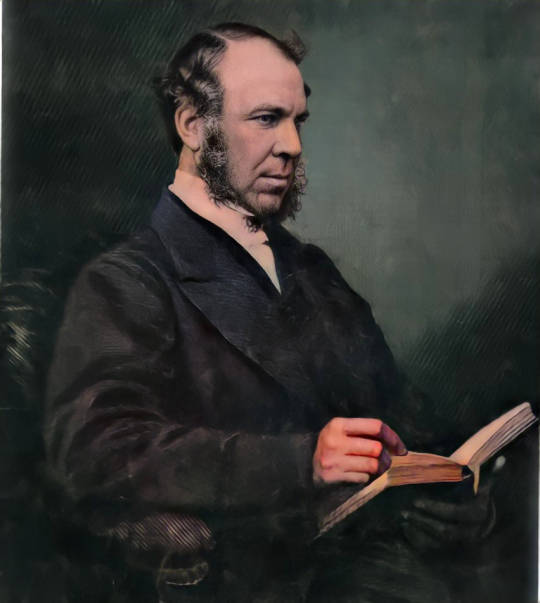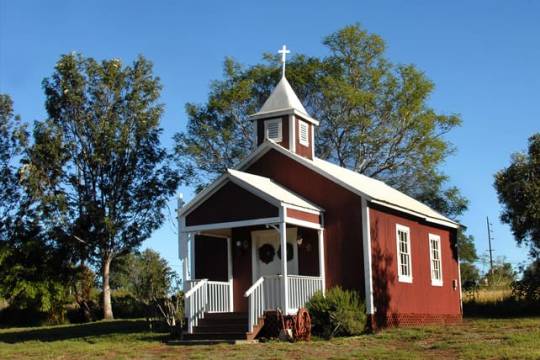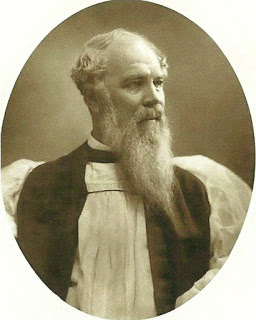#The J.C. Ryle Archive
Explore tagged Tumblr posts
Text
Christ’s View of His Servants

by J.C. Ryle
The least and lowest of believers will find that he is counted among Christ’s servants, and that his labor has not been in vain in the Lord.
He will discover to his amazement, that his Master’s eye saw more beauty in his efforts to please Him, than he ever saw himself. He will find that every hour spent in Christ’s service, and every word spoken on Christ’s behalf, has been written in a book of remembrance. Let believers remember these things and take courage. The cross may be heavy now, but the glorious reward shall make amends for all.
22 notes
·
View notes
Text
Wealth and Poverty from God’s View

by J.C. Ryle
Let us never give way to the common idea that people are to be valued according to their income, and that the person who has most money is the one who ought to be the most highly esteemed.
There is no authority for this notion in the Bible. The general teaching of Scripture is flatly opposed to it. “Not many wise, not many mighty, not many noble are called” (1 Cor. 1:26). “Let not the rich man glory in his riches. But let him that glories glory in this, that he knows and understands me” (Jeremiah 9:24). Wealth is no mark of God’s favor. Poverty is no mark of God’s displeasure. Those whom God justifies and glorifies are seldom the rich of this world. If we would measure people as God measures them, we must value them according to their grace.
16 notes
·
View notes
Text
Applying Your Bible Reading

by J.C. Ryle
“Next to praying there is nothing so important in practical religion as Bible reading. By reading that book we may learn what to believe, what to be, and what to do; how to live with comfort, and how to die in peace.
“Happy is that man who possesses a Bible! Happier still is he who reads it! Happiest of all is he who not only reads it, but obeys it, and makes it the rule of his faith and practice!”
14 notes
·
View notes
Text

Grasp the Truth of the Cross by J.C. Ryle
Let us never forget the sacrificial character of Christ’s death. Let us reject with abhorrence the modern notion that it was nothing more than a mighty instance of self-sacrifice and self-denial.
It was this no doubt – but it was something far higher, deeper, and more important than this. It was a propitiation for the sins of the world. It was an atonement for man’s transgression. It was the killing of the true passover Lamb, through whose death destruction is warded off from sinners believing on Him. “Christ our passover Lamb,” says Paul, “is sacrificed for us.” (1 Cor. 5:7) Let us grasp that truth firmly, and never let it go.
9 notes
·
View notes
Text
Steadily Following Christ

by J.C. Ryle
Oh that Christians, the very best of them, were not so slack in following! Some stop to trifle with the perishable things of earth. Some stop to pick up the gaudy, scentless flowers by the wayside.
Some stop to sleep, forgetting this is not our rest, it is enchanted ground. Some stop to pick holes and find fault with their fellow-travelers. Few of Christ’s sheep do hold on their way as steadily as they might. But still, compared with the world, they are following Christ Jesus.
Oh that they would only remember, those who follow Him most fully, shall follow Him most comfortably! They are following Christ Jesus, and they know where they are going; and even in the dark river, in the valley of the shadow of death, they feel a confidence that their Shepherd will be with them, and His rod and His staff will comfort them. They would all tell you they are poor wandering sheep, less than the least of all God’s mercies, ashamed of the little fruit they bear—but still, weak as they are, they are determined to follow on to the end, and to say, “None but Christ, in life and in death, in time and in eternity.”
10 notes
·
View notes
Text

The Old Serpent by J.C. Ryle
“Let us first mark in this passage, the power and unwearied malice of the devil. That old serpent who tempted Adam to sin in Paradise, was not afraid to assault the second Adam, the Son of God.
Whether he understood that Jesus was ‘God manifest in the flesh’ may perhaps be doubted. But that he saw in Jesus One who had come into the world to overthrow his kingdom, is clear and plain.
He had seen what happened at our Lord’s baptism. He had heard the marvellous words from heaven. He felt that the great Friend of man was come, and that his own dominion was in peril.
The Redeemer had come. The prison door was about to be thrown open. The lawful captives were about to be set free. All this, we need not doubt, Satan saw, and resolved to fight for his own.
The prince of this world would not give way to the Prince of peace without a mighty struggle.
He had overcome the first Adam in the garden of Eden;—why should be not overcome the second Adam in the wilderness? He had spoiled man once of Paradise;—why should he not spoil him of the kingdom of God?”
8 notes
·
View notes
Text
Peace Which Christ Gives

by J.C. Ryle
“‘Peace I leave with you, my peace I give unto you; not as the world giveth give I unto you.’ Peace is Christ’s peculiar gift: not money, not worldly ease, not temporal prosperity. These are at best very questionable possessions. They often do more harm than good to the soul.
They act as clogs and weights to our spiritual life. Inward peace of conscience, arising from a sense of pardoned sin and reconciliation with God, is a far greater blessing. This peace is the property of all believers, whether high or low, rich or poor.
The peace which Christ gives He calls ‘My peace.’ It is specially His own to give, because He bought it by His own blood, purchased it by His own substitution, and is appointed by the Father to dispense it to a perishing world.
Just as Joseph was sealed and commissioned to give corn to the starving Egyptians, so is Christ specially commissioned, in the counsels of the Eternal Trinity, to give peace to mankind.
The peace that Christ gives is not given as the world gives. What He gives the world cannot give at all, and what He gives is given neither unwillingly, nor sparingly, nor for a little time. Christ is far more willing to give than the world is to receive.
What He gives He gives to all eternity, and never takes away. He is ready to give abundantly above all that we can ask or think. ‘Open thy mouth wide,’ He says, ‘and I will fill it.’ (Psalm 81:10.)
Who can wonder that a legacy like this should be backed by the renewed emphatic charge, ‘Let not your heart be troubled, neither let it be afraid?’ There is nothing lacking on Christ’s part for our comfort, if we will only come to Him, believe, and receive.
The chief of sinners has no cause to be afraid. If we will only look to the one true Saviour, there is medicine for every trouble of heart. Half our doubts and fears arise from dim perceptions of the real nature of Christ’s Gospel.”
11 notes
·
View notes
Photo

The Soul Ruining Sin of Pride by J.C. Ryle
It is an dreadful fact, whether we like to allow it or not, that pride is one of the common sins which beset human nature. We are all born Pharisees. We all naturally think far better of ourselves than we ought.
We all naturally imagine that we deserve something better than we have. It is an old sin. It began in the garden of Eden, when Adam and Eve thought they had not got everything that their merits deserved. It is a subtle sin. It rules and reigns in many a heart without being detected, and can even wear the garb of humility. It is a most soul ruining sin. It prevents repentance, keeps men back from Christ – checks brotherly love, and nips in the bud spiritual desires. Let us watch against it, and be on our guard. Of all garments, none is so graceful, none wears so well, and none is so rare, as true humility.
8 notes
·
View notes
Photo

How God Measures a Church by J.C. Ryle
We may depend upon it—that knowledge of Christ, obedience to Christ, and the fruits of the Spirit—are the only tests by which God weighs and measures any Church.
If these are absent, He cares nothing for beautiful buildings, fine singing, and a pompous ceremonial. These are ‘leaves,’ and He desires to see not leaves only, but ‘fruit’. The tree of the Church of England perhaps never had so many leaves on it, as it has just now. I wish there was a corresponding quantity of fruit!
8 notes
·
View notes
Text
No Holy Spirit = No Christ = No Heaven

by J.C. Ryle
Let it be distinctly understood that the person who does not have the Spirit, does not have Christ. They who do not have Christ have no pardon of their sins—no peace with God—no title to heaven—no well-grounded hope of being saved.
Their religion is like the house built on the sand. It may look well in fine weather. It may satisfy them in the time of health and prosperity. But when the flood rises, and the wind blows—when sickness and trouble come up against them, it will fall and bury them under its ruins. They live without a good hope, and without a good hope they die. They will rise again only to be miserable. They will stand in the judgment only to be condemned; they will see saints and angels looking on, and remember they might have been among them—but too late; they will see lost myriads around them, and find they cannot comfort them—but too late. This will be the end of the person who thinks that they can reach heaven without the Spirit.
10 notes
·
View notes
Photo

Repentance by J.C. Ryle
Repentance is a thorough change of person’s natural heart, upon the subject of sin. We are all born in sin. We naturally love sin.
We take to sin, as soon as we can act and think—just as the bird takes to flying, and the fish takes to swimming. There never was a child that required schooling or education in order to learn deceitfulness, selfishness, passion, self-will, gluttony, pride and foolishness. These things are not picked up from bad companions, or gradually learned by a long course of tedious instruction. They spring up of themselves, even when boys and girls are brought up alone.
The seeds of them are evidently the natural product of the heart. The aptitude of all children to these evil things is an unanswerable proof of the corruption and fall of man. Now when this heart of ours is changed by the Holy Spirit, when this natural love of sin is cast out, then takes place that change which the Word of God calls “repentance.” The person in whom the change is created is said to “repent.” They may be called, in one word, a repentant person.
9 notes
·
View notes
Text
Steadily Following Christ

by J.C. Ryle
Oh that Christians, the very best of them, were not so slack in following! Some stop to trifle with the perishable things of earth. Some stop to pick up the gaudy, scentless flowers by the wayside.
Some stop to sleep, forgetting this is not our rest, it is enchanted ground. Some stop to pick holes and find fault with their fellow-travelers. Few of Christ’s sheep do hold on their way as steadily as they might. But still, compared with the world, they are following Christ Jesus.
Oh that they would only remember, those who follow Him most fully, shall follow Him most comfortably! They are following Christ Jesus, and they know where they are going; and even in the dark river, in the valley of the shadow of death, they feel a confidence that their Shepherd will be with them, and His rod and His staff will comfort them. They would all tell you they are poor wandering sheep, less than the least of all God’s mercies, ashamed of the little fruit they bear—but still, weak as they are, they are determined to follow on to the end, and to say, “None but Christ, in life and in death, in time and in eternity.”
7 notes
·
View notes
Text
Are You a Noble-Minded Berean?

by J.C. Ryle
The state of mind we should always desire to possess is that of the noble-minded Bereans.
When they first heard the Apostle Paul preach, they listened with attention. They received the Word “with all readiness of mind.” They “searched the Scriptures,” and compared what they heard with God’s Word. “And therefore,” we are told, “many of them believed.” Happy are those who go and do likewise! (Acts 17:11, 12.).
8 notes
·
View notes
Text
The Right Heart in Prayer

by J.C. Ryle
Of all the list of Christian duties there is none to which there is such abounding encouragement as prayer. It is the duty which concerns all.
High and low, rich and poor, learned and unlearned – all must pray. Above all, it is a duty in which everything depends on the heart and motive within. Our words may be feeble and ill-chosen, and our language broken and ungrammatical, and unworthy to be written down. But if the heart if right, it matters not. He that sits in heaven can spell out the meaning of every petition sent up in the name of Jesus, and can make him that asks know and feel that he receives.
7 notes
·
View notes
Text
Getting Beyond A Hearer of Truth

by J.C. Ryle
The man who hears Christian teaching, and never gets beyond hearing, is like “a foolish man who built his house on the sand” [Matt. 7:26]. He satisfies himself with listening and approving, but he goes no further.
He flatters himself, perhaps, that all is right with his soul, because he has feelings, convictions, and desires, of a spiritual kind. In these he rests. He never really breaks off from sin, and casts aside the spirit of the world. He never really lays hold of Christ. He never really takes up the cross. He is a hearer of truth, but nothing more.
7 notes
·
View notes
